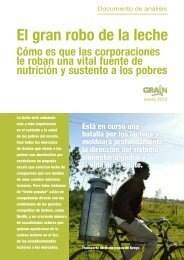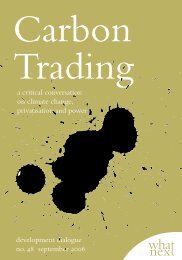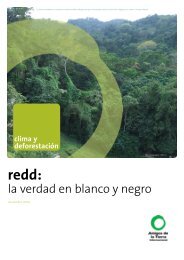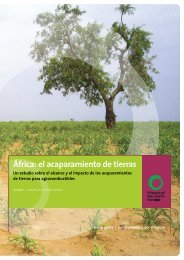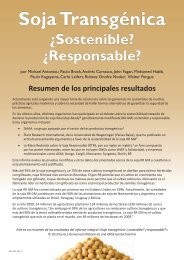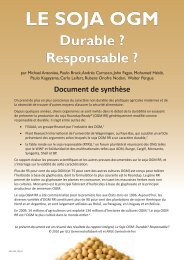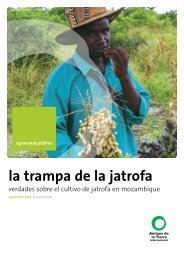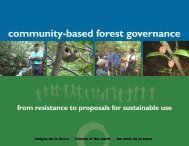Plantations, poverty and power - Critical Information Collective
Plantations, poverty and power - Critical Information Collective
Plantations, poverty and power - Critical Information Collective
You also want an ePaper? Increase the reach of your titles
YUMPU automatically turns print PDFs into web optimized ePapers that Google loves.
14<br />
Campaigners in Tasmania <strong>and</strong> Japan succeeded in persuading Japanese importers of wood chips from<br />
Tasmania not to use wood chips from old-growth forests. As a result, exports of wood chips from<br />
Tasmania to Japan have dropped in recent years. However, the decrease in exports from Tasmania is<br />
matched by an increase in exports to Japan of wood chips from industrial tree plantations in South Africa.<br />
The pulp <strong>and</strong> paper industry’s global dem<strong>and</strong> for cheap wood fibre has shifted the destruction from<br />
Tasmania’s old-growth forests to South Africa’s grassl<strong>and</strong>s.<br />
Government regulation of pollution from pulp mills is often less stringent in the South. St<strong>and</strong>ards in<br />
countries in the North are “essentially the same”, according to International Paper’s Thomas Jorling, who<br />
has spent almost 30 years working in the paper industry. “There are differences, however, in some of the<br />
developing countries where they don’t have regulations yet for some types of substances that Westernized<br />
countries do,” he said in a 2004 interview, with Paper Watch. 33<br />
An important difference, for example, is the length of time it can take to get government permission to<br />
build a massive new pulp mill. “Permits can be achieved in a much more rapid time outside the U.S.,”<br />
says Jorling. “The average time now for a major capital permit in the U.S. is three years, whereas in<br />
Europe it’s probably six months <strong>and</strong> in Brazil it’s a couple of weeks. In those countries, you don’t tie up<br />
capital waiting for permits.” 34<br />
Subsidies <strong>and</strong> dictatorships<br />
“L<strong>and</strong> is cheap in both Brazil <strong>and</strong> Chile, generous government subsidies encourage reforestation (sic),<br />
<strong>and</strong> trees grow faster there than almost anywhere else in the world,” explained an article in the Financial<br />
Times in 1992. 35 In several countries, these “generous government subsidies” were implemented under<br />
military dictatorships or extremely repressive regimes. In addition to financial subsidies, the use of force<br />
by governments to remove local people from their l<strong>and</strong> is a subsidy little discussed by the industry itself,<br />
for obvious reasons.<br />
In Thail<strong>and</strong>, a massive expansion of industrial tree plantations was planned in the late 1980s, by an<br />
alliance of the pulp <strong>and</strong> paper industry, the Royal Forestry Department <strong>and</strong> the army. The Green Isaan<br />
Project started in 1987, which included plans for the army to solve the drought problems in north-east<br />
Thail<strong>and</strong> by building dams <strong>and</strong> “regreening” by planting eucalyptus trees. The British company Biwater<br />
carried out the feasibility study <strong>and</strong> co-wrote the Master Plan for the project. The project also received<br />
support from the British government. 36 A second project started in 1990, the L<strong>and</strong> Distribution<br />
Programme for the Poor Living in Degraded National Forest Reserves in North-east Thail<strong>and</strong>, known by<br />
the Thai initials, Khor Jor Kor. Despite the project’s benign-sounding name the project was carried out by<br />
the military’s Internal Security Operations Comm<strong>and</strong> <strong>and</strong> aimed to evict five million villagers from<br />
National Reserve Forests <strong>and</strong> planting 1.37 million hectares of industrial tree plantations. 37<br />
33 “Environmental Balancing Act”, Paper Watch, BILT Corporate Communications, Issue no. 52, 5 July 2004, page 4.<br />
Paper Watch is the Indian company BILT’s corporate publication.<br />
34 “Environmental Balancing Act”, Paper Watch, BILT Corporate Communications, Issue no. 52, 5 July 2004, page 4.<br />
35 Leslie Crawford (1992) “Cheaper l<strong>and</strong>, faster trees - Regional report: Latin America”, Financial Times, 14 December 1992.<br />
36 Oliver Pye (2005) Khor Jor Kor Forest Politics in Thail<strong>and</strong>, White Lotus Press.<br />
37 Ricardo Carrere <strong>and</strong> Larry Lohmann (1996) Pulping the South Industrial Tree <strong>Plantations</strong> <strong>and</strong> the World Paper Economy,<br />
Zed Books, page 237.



